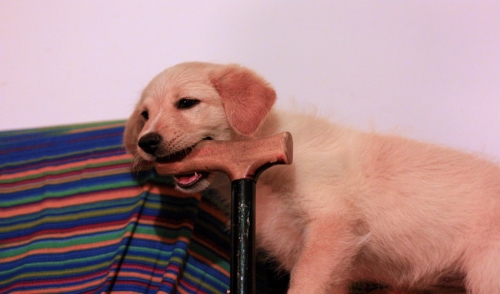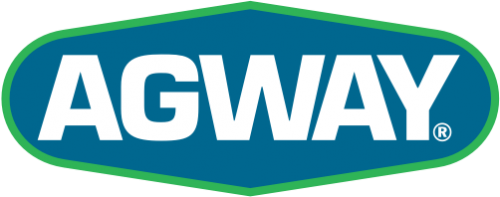{article.name}
Agway, NY -
Hometown Values & Service!
Chatham Agway: 518-392-3241
Claverack Agway: 518-851-5391
Great Barrington Agway: 413-528-2390
Millerton Agway: 518-789-4471
How to Get Your Puppy to Stop Biting Everything

- Share this:
- Share on Facebook
- Pin on Pinterest
- Tweet on Twitter
It is normal for puppies to mouth, chew, gnaw and bite everything they come across – a dog's mouth is sensitive and young puppies are simply investigating their world. As their jaws grow stronger and their teeth mature, however, simple bites can start causing damage and may be painful, and it is wise for dog owners to teach their puppies not to bite from an early age. Puppies normally learn to control their bite pressure from their mothers and littermates, but it is easy for human owners to simulate those lessons and teach puppies proper behavior.
- Take a Time Out
When a puppy bites too hard, make a loud, sharp yelping noise, similar to how another puppy would react to too-rough play. Stop moving and let your hand go limp, and the puppy should be startled and release your hand. Refuse to start playing again for a minute or two, until the puppy shows contriteness by lowering its ears, licking or whining.
- Substitute Toys
When a puppy begins biting or gnawing on something inappropriate – whether it is a hand, foot, shoe or other object – immediately remove the object and offer them a designated chew toy or bone instead. This teaches the puppy what can be chewed on and what cannot, but still allows them to exercise their teeth and jaws.
- Avoid Biting Games
Some games, such as tug of war, chasing games or grabbing games, encourage hunting behavior and instincts that include hard biting. Do not play these games with young puppies until they have learned to control their bites and know what they can and cannot chew on. Similarly, never roughhouse near a puppy's face, which could initiate a biting reaction.
- Reward Good Reactions
When a puppy learns the signals for not biting and responds appropriately to your commands to stop, reward that training with a small treat, gesture of affection or good word. Puppies want the approval of their pack and leaders, and if you offer that approval when they stop biting, they will quickly learn what behavior is desirable.
- Try Taste Deterrents
If a puppy won't stop chewing on inappropriate items, use bitter-tasting sprays or wipes to discourage their interest. Bitter apple products are effective, or you can opt for apple cider vinegar wiped onto items until the puppy learns not to chew, and you can even put a light coating on hands or feet to discourage biting. Never use harsh cleaning chemicals or other potentially toxic or poisonous options, however.
- Keep Training the Puppy
Puppies need leadership, and ongoing training sessions will help dog owners establish their natural dominance over their pets. When puppies learn who is in charge, they will no longer treat that leader as a chew toy and biting will diminish. A trained puppy will also be more likely to obey additional commands to stop biting or chewing.
- Provide Plentiful Exercise
A puppy with too much energy will eagerly investigate everything nearby, chewing and gnawing to satiate its curiosity. A tired puppy, on the other hand, is far more likely to cuddle up and take a nap! Provide puppies with plenty of walks and other exercise to work off their abundant energy so they are less likely to engage in idle chewing.
The most important thing any dog owner can do to keep their puppy from biting is to be consistent. All family members should use the same techniques and training cues to help the puppy learn the proper behavior, or else the puppy may get confused and be uncertain about what is or isn't acceptable. If they are consistently trained, however, a puppy will quickly learn that biting isn't appropriate, and both puppies and their owners can enjoy gentle, happy play.
© 2026 Millerton Co-op Inc.. All rights reserved.
Serving Millerton, NY - Claverack, NY - Chatham, NY - Great Barrington, MA and the Surrounding Communities.
View our accessibility statement
Driven by New Media Retailer
Agway® is a division of Southern States®



Comments